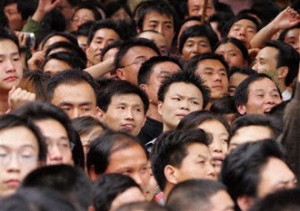Chinese Census Brings Criticism Of One-Child Rule
 The Wall Street Journal reports:
The Wall Street Journal reports:
BEIJING—China's latest census shows the nation's population is aging rapidly and its growth rate has declined sharply, raising new questions about the government's unwillingness to abandon its controversial one-child policy despite warnings of a looming demographic crunch.
When the Chinese government launched the world's biggest demographic experiment in 1980, it said it would take about 30 years to tame the nation's explosive population growth once encouraged by Chairman Mao Zedong.
China appears to have achieved that goal: Initial census results released Thursday show China's population, the world's largest, rose to 1.34 billion as of last year, from 1.27 billion in 2000. That puts average annual growth at 0.57% over the decade, down from 1.07% in 1990-2000.
The census, conducted last year, also shows that people over the age of 60 now account for 13.3% of China's population, compared to 10.3% in 2000. And the reserve of future workers has dwindled: People under 14 now make up 16.6% of the population, down from 23% 10 years ago.
Yet China's leaders vowed again this week to maintain the one-child family-planning policy. This despite the census results and a decade-long campaign by an informal advocacy group of top Chinese academics and former officials who have risked their careers to argue the policy is based on flawed science and vested bureaucratic interests. China's policy is enforced by the National Population and Family Planning Commission, which employs a half-million full-time staffers and six million part-timers. It collects millions of dollars a year in fines from people who violate family-planning rules.
Chinese leaders credit the policy with preventing 400 million births, helping to lift the country out of poverty and limit its carbon emissions.
Under China's one-child policy, many (but not all) couples who have more than one child face fines of several months' salary and can lose their jobs if they work for the state. The program has also led to some forced abortions and sterilizations.
According to several people close to the Family Planning Commission, the agency is believed to be considering limited pilot plans to relax the policy. But the informal advocacy group pressing for change say those measures are too little, and too late, to address a demographic crunch that will fundamentally reshape China's economy and society.
They say China's elderly population is expanding rapidly as Mao-era baby boomers retire, putting new burdens on society to cover the cost of their retirement. At the same time, China's labor force is due to start shrinking in 2016, reversing the demographic phenomenon of a widening pool of low-cost labor that powered a manufacturing boom over the past three decades.
The number of workers aged 20-to-24 is already declining due to the lower birth rate two decades ago and a rise in the number of young people seeking higher education. China's traditional preference for boys also means the nation now has about 120 males for every 100 females. By 2020 China could be home to as many as 24 million single young men with little prospect of marrying or having their own children.
The solution, members of the advocacy group argue, is for China to move swiftly to a "two-child" policy, and possibly to offer incentives for couples to have a second child. That, they say, would help China to avoid the fate of Japan and some Western countries that are struggling with an aging population and shrinking work force.
China's leadership appears to be dragging its feet on lifting the one-child limit nationwide in part because it is wary of controversy ahead of a once-a-decade Communist Party leadership change next year. The man in charge of population issues is Vice Premier Li Keqiang, the frontrunner to take over as premier.
The group advocating for ending the one-child policy thought the change "would be a simple matter," said Gu Baochang, a professor of demography at Renmin University in Beijing, former adviser to the Family Planning Commission and informal leader of the advocacy group. Changing the policy, he says, is "so necessary demographically, and so wise politically. But resistance was so strong—much stronger than we had thought."
The government inaction is all the more notable because the family-planning bureaucracy is a lightning rod for public resentment.
Click here to read more.

